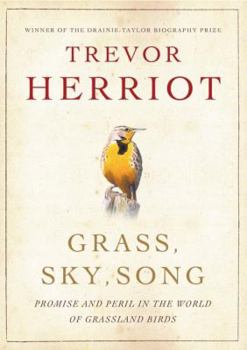Grass, Sky, Song: Promise and Peril in World of Grassland Birds
Select Format
Select Condition 
Book Overview
Readers, booksellers and literary judges alike fell in love with Trevor Herriot's stunning debut book, River in a Dry Land. In his remarkable new work, he draws on 20 years' experience as an observer of nature to reveal the spirit of the grassland world, and the uniqueness of its birds. Facing the demise of the very creatures that he has always depended on for his sense of home, Herriot sets out to discover why birds are disappearing and what, if anything, we can do to save them. He takes us out to local pastures where a few prairie songbirds sing and nest, as well as to the open rangeland where doomed populations of burrowing owls and greater sage-grouse cling to survival. In a narrative that is at once profound, intimate and informative, we meet passionate bird researchers and travel in the footsteps of 19th-century botanist John Macoun, the last naturalist to see the Great Plains in its pre-settlement grandeur. In the spirit of Rachel Carson's Silent Spring and Bruce Chatwin's The Songlines, this arresting book fills the heart with wonder and reveals that any hope for the endangered wildness in North America's heartland depends on people making the right choices--on farms, in legislatures and in board rooms, and even at the supermarket. Beautifully illustrated with the author's own drawings, Grass, Sky, Song awakens our senses to the glory of all birds and calls for a renewed bond between culture and nature.
Format:Hardcover
Language:English
ISBN:1554680387
ISBN13:9781554680382
Release Date:February 2009
Publisher:HarperCollins Publishers
Length:288 Pages
Weight:1.10 lbs.
Dimensions:5.5" x 8.5"
Customer Reviews
1 rating
Another solid title from the new Prairie naturalist
Published by Thriftbooks.com User , 14 years ago
I'm an Australian who lived in the prarie region of Canada for 2 years and fell in love with the place instantly. I took, and still take, a keen interest in the ecology of the region and human ecology (people's interactions with their environment) especially. While this book is primarily about grassland birds, Trevor Herriot being a keen observer of prairie natural history and a gifted writer and observer makes it so much more. He takes the case of those beautiful muses of the expansive grasses and links them back to that ever-present yet un-definable "spirit" anyone who's really taken the time to get to know the great plains will describe to you. To me the book takes to the plight of a fading world and peoples' roles in that change rather than a kind of trainspotters guide to prairie bird varieties (you don't need a tweed hat and a pair of binnoculars to really get into this one! although a love of wide open prairie spaces is highly reccommended). In doing so Herriot manages to describe the vast shifts the spirit of the prairie has undergone in the last century and to link this to human acitivity in the area - namely a change from a regime of mobile and free moving bands of people engaged in buffalo hunting and judicious use of fire, to eradicted buffalo, smothered fires and confined spaces - but does so without making trite romanticisations of a past-life, or making crude hollywood charicatures of the Indigenous peoples of the plains. There is much to be admired about these cultures, their respect and understanding for the spirit of the prairies and all that goes with keeping it healthy and especially their love and care for the birds of the plains. Herriot paints this vision of respect in a realistic lens of equals looking to equals. No mystic wolf-spirit, full moon, feathered headressed chief pictures here. Most impressively Herriot makes very practical observations for how an agrarian lifestyle, quite alien to the ecology of the plains, can make sensible, responsible, practical and generous steps towards really becoming a part of the place where it dwells, and not simply existing on top of it and often in competition with it's natural neighbours. This he suggests can well and truly begin to happen without radical change and the abandonment all-together of this lifestyle (something radical ecologists often spout without ever stepping out of the ideal abstract and onto the ground). Something often lacking in naturalist writing is his realistic and incisive view of the plight of our natural friends and relations without descending into blame-slinging and hopeless disempowerment. Herriot ultimately shows us that by adapting, learning to share and accomodate - as these singing prairie marvels have done to survive - we can move beyond needless decimation of other species and begin to develop a really healthy sense of respect for our place in the natural world, our neighbours and relatives there and ultimately ourselves as we build a very deep






